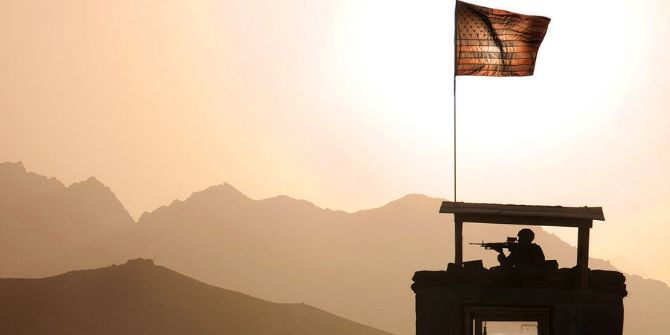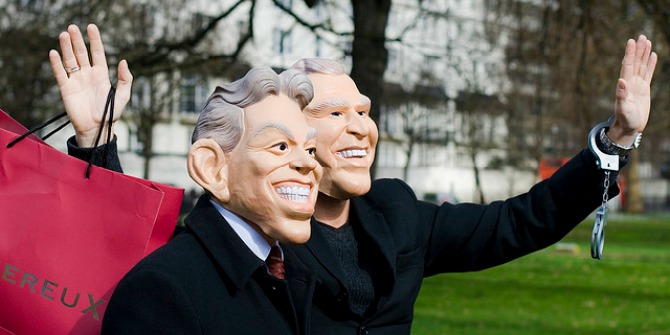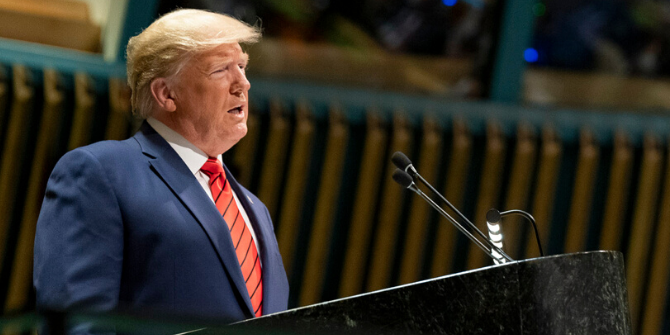Professor Michael Cox discusses his new book, Agonies of Empire: American Power from Clinton to Biden, which explores how five very different American Presidents have addressed US foreign policy since the end of the Cold War. In so doing, the book examines the deep sources of American power, the crisis many claim the US is now facing and how this may relate to the current war in Ukraine.
If you are interested in this book review, you watch a video or listen to a podcast of author Professor Michael Cox discussing Agonies of Empire at an LSE public event, recorded on 24 March 2022.
Agonies of Empire: American Power from Clinton to Biden. Michael Cox. Bristol University Press. 2022.
Find this book (affiliate link):![]()
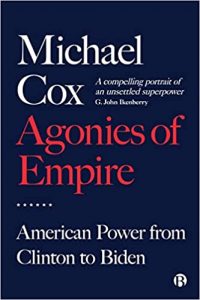 Brits tend to think that because the UK has a ‘special relationship’ with the United States, they not only understand the US better than most other people. They also believe they have an inside track to the corridors of power in Washington which allows them to shape US foreign policy in ways that other less well-connected states cannot. Born of a shared history, united by a common language and fighting on the same side in the three great conflicts of the twentieth century, this idea is not entirely fanciful. Yet as I have discovered in my work on Anglo-American relations, always beware the siren call of ‘specialness’.
Brits tend to think that because the UK has a ‘special relationship’ with the United States, they not only understand the US better than most other people. They also believe they have an inside track to the corridors of power in Washington which allows them to shape US foreign policy in ways that other less well-connected states cannot. Born of a shared history, united by a common language and fighting on the same side in the three great conflicts of the twentieth century, this idea is not entirely fanciful. Yet as I have discovered in my work on Anglo-American relations, always beware the siren call of ‘specialness’.
Indeed, as history shows, if and when the US decides to act, it will do so (and often has) with the minimum of consultation. Thus, despite much pleading by John Maynard Keynes in 1919, President Woodrow Wilson refused to cancel Britain’s wartime debt after the First World War. President Harry S. Truman then cancelled the Lend-Lease Act in 1945. And several decades later, Prime Minister Margaret Thatcher – who prided herself on her very close relationship with President Ronald Reagan – discovered that she was often ignored on many of the big policy questions facing Washington in the 1980s. More recently, President Joe Biden decided to withdraw from Afghanistan without much ‘consultation’ with London. The truth is that when you have vast power, you can often do what you want without getting permission from others.
Nor should we fall for another myth: that the United States is just like us, only bigger. As I have found out myself having visited and taught in America on numerous occasions – never less than enjoyable experiences, I should add – the US is most definitely not like us, or anybody else for that matter. America is richer, its universities much better endowed, its military far more powerful and its citizens far more patriotic. The US prides itself on being unique – ‘exceptional’ even – and in many ways it is.
Yet, for a nation on whose fate we all depend, it still remains a somewhat inward-looking country, greatly fascinated by itself, but a little less interested in the world beyond its borders. The fact that over 55 per cent of its people do not own a passport must tell us something about this most parochial of superpowers.

Image Credit: Photo by David Beale on Unsplash
Even its many fine academics have not quite escaped the tendency to intellectual self-absorption. They may travel, and most do. Many speak a language other than English. They are brilliant at setting up study programmes abroad. And many do quite outstanding work, much of which is regarded as setting the gold standard for scholarship. Even so, one gets the impression that many American academics in the social sciences tend to look inwards rather than outwards. Hence, they are more inclined to cite each other rather than anybody else. More often than not, they try and publish in American journals. And few, as far as I can ascertain, take a great deal of notice of what is published outside the US. Certainly in my own chosen field of International Relations (IR), American work still dominates, though perhaps less so now than before.
Not that we should be so surprised or even upset by this. With more than 4,000 institutions of higher education teaching close to 20 million students and boasting at least half of the world’s top institutions of higher education, not to mention a dazzling array of often well-funded think tanks, the educational ecosystem in the US is just vast. Little wonder Americans find it easier living in their own intellectual space.
Why then stray into an area such as US foreign policy where American scholars have a near monopoly and about which they write and reflect upon with great regularity? Why indeed, I sometimes asked myself after having finally pulled together a collection of my essays, old and new, dealing with American power since the end of the Cold War. There is no easy answer. But one I think does ring true: looking at a subject from the outside in, rather than from the inside out, one might just be able to bring something to the table that those living inside the beast cannot. There are no guarantees, of course. Yet having some degree of separation does help.
That said, what precisely does my book, Agonies of Empire, say about the role of the US in the world since the collapse of the USSR? The first and most startling thing is that for all its challenges, mistakes and misadventures over the past 30 years, the US seems to have a rare capacity for recovering from what at the time looked like fatal blows. Against the advice of most academics – including nearly all my American colleagues – President George W. Bush decided to invade Iraq in 2003. But what was the impact of what President Barack Obama called this ‘dumb war’ on America’s position in the international system? Damaging enough, to be sure, but in truth, much less of a hammer blow than some predicted at the time.
The US then went through the trauma of the 2008 financial crisis. The world economy teetered on the brink. But ten years later, the Dow Jones had more than doubled while the US surged ahead in the digital age to lead the world. We were then informed that China’s economic rise would see the US dollar displaced by the renminbi. The well-respected economist Barry Eichengreen even predicted that ‘the current dollar-centric system’ would not last ‘for ever’. Perhaps so. However, in 2022, the US dollar remains the reserve currency of choice.
Nor, I suspect, did President Donald Trump do as much damage to US power as many feared. As I show in Agonies of Empire, there is little doubt that he tarnished America’s soft power image abroad while leaving allies (if not Russian President Vladimir Putin) wondering what was going on. Yet, in spite of Trump’s dubious record on so many issues, from immigration to his handling of the COVID-19 pandemic, when he left office the US economy was growing, defence spending was on the rise and, in spite of his costly trade war with China, US unemployment was at an all-time low. Little wonder he won more votes in 2020 than 2016, and little wonder either that some pundits are predicting he will be President again in 2024.
So what about Biden? Low poll ratings at home might suggest he is a one-term president. Yet America’s natural friends around the world clearly prefer him to Trump. Indeed, in spite of many missteps along the way – including the disastrous manner in which he handled the West’s final withdrawal from Afghanistan in August 2021 – Biden has done a great deal to rebuild US relations with traditional partners in both Europe and Asia. My book went to press before the Russia invasion of Ukraine (something which few of us thought would happen). But one must wonder what would have occurred if Trump rather than Biden had been in the White House.
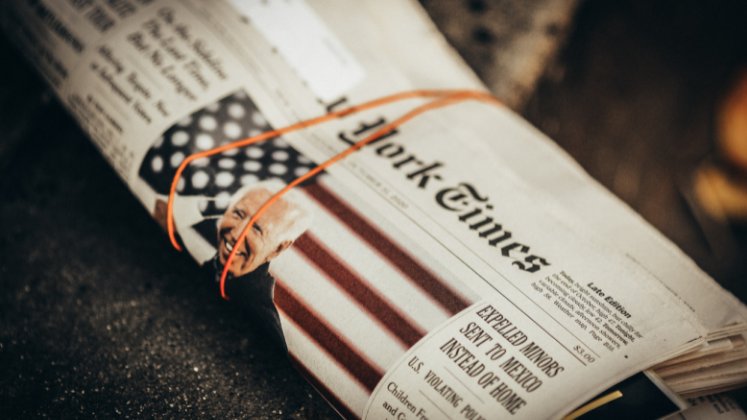 Image Credit: Photo by Jon Tyson on Unsplash
Image Credit: Photo by Jon Tyson on Unsplash
This also raises the intriguing question of what difference individual presidents make to the conduct of US foreign policy? IR scholars generally prefer to talk in sweeping terms about structures of national power within a defined international system where there is no higher authority – ‘anarchy’ by any other name. But what about the role of the individual, especially one as significant as President of the United States? As I indicate in my book, they clearly make a difference.
Bill Clinton certainly did. Little interested in traditional foreign policy questions, he was however keenly aware of the importance of economics. Like the good liberal he was, he tended to look at the world through a particular prism, one organised around the belief that the new post-Cold-War world was just as likely to be shaped by globalisation as the threat posed by other states.
George W. Bush’s whole presidency was in turn determined by his own deeply held conservative views and a growing belief after 9/11 that the only way of dealing with an undeterrable terrorist threat was by an assertive use of American power. Obama had a quite different outlook. He never accepted that the US was in decline. Nonetheless, he did agree that the world was becoming ‘post-American’ and that if it wished to lead, it would have to do so in a more imaginative and subtle way.
But what about the republic’s ongoing travails? How did a nation with so much tangible power – 12 aircraft carrier battle groups, military bases in 85 countries and around 20 per cent of the world’s GDP – find itself at the beginning of 2021 with its Congress under siege and the presidential inauguration requiring the presence of 25,000 National Guard members on the streets of Washington? And why only a few months later did it find itself scuttling out of Kabul with its tail between its legs, and a few months on engaged in a proxy war with Russia?
There is no simple, one-size-fits-all answer to the question of what might have gone wrong. And I don’t try and provide one in Agonies of Empire. The lazy answer for liberals is of course Trump – and the equally lazy one for conservatives is of course liberalism. But this only takes us so far. What we really need is a much deeper analysis which not only explains why great powers always find it difficult living up to their own self-proclaimed rhetoric, but also why a nation as powerful as the US no longer appears willing to carry the responsibility of global leadership. As Professor Peter Trubowitz of LSE has pointed out, the real issue facing America today is not a lack of power, but rather a homeward bound, not to mention deeply polarised, electorate, whose support for America’s global role (however defined) is receding.
Nor should we ignore the role played by miscalculation. Clearly going into Iraq was a major mistake. Predictably, the Libyan adventure ended badly. Nor did Obama help when he drew a red line in the proverbial sand over Syria and then did nothing when President Bashar al-Assad crossed it when he deployed chemical weapons (something his government always denied).
Many have also argued that the US might have handled Russia differently, even given it aid to facilitate the transition towards a ‘normal’ functioning market economy after the collapse of the USSR. No doubt the US could have been more generous towards Russia when it came to providing it with economic support. But it would be quite inaccurate to suggest that it was consistently hostile towards post-communist Russia. As my book shows, it made quite a few attempts to engage Russia, almost to the point of overlooking some of its less savoury political practices. Clinton for one went out of his way to work with Russian reformers in the 1990s. George W. Bush later said Putin was a man with a ‘soul’ whom he could trust. Obama then tried to reset relations with Russia in 2009. And Trump, of course, insisted that there were no fundamental issues dividing Russia from the United States.
Then, of course, there is the vexed question of NATO ‘enlargement’ and whether or not that by pushing for Ukraine to join the alliance, Washington provoked Putin into military action. The story in my telling is altogether more complicated. There is little doubt that NATO’s eastward move upset Russia. But this hardly explains Putin’s decision to go to war against Ukraine (twice). Putin, in fact, was not even consistently hostile towards NATO. Indeed, back in 2000 he even wondered whether Russia might not join the organisation.
Nor in truth was there ever very much chance of Ukraine joining NATO. In fact, within NATO itself there was very little enthusiasm for actually bringing Ukraine in – partly because Ukraine was not deemed fit or ready for membership, partly because a fair number of NATO members like France and Germany were opposed, and partly because policymakers in Washington did not wish to provide Article 5 guarantees to a country like Ukraine, living then as now in an unsettled region with a potentially dangerous neighbour to the north.
It is also worth remembering that it was not Ukraine’s desire to join NATO that precipitated the breakdown of relations between Russia and the West. Rather this happened when the European Union – an organisation with no tanks and of which the US is not a member – tried to enter into an ‘Association Agreement’ with the government in Kyiv in 2013. Even in the days running up to Russia’s invasion in February 2022, Ukraine was not pressing its claim for membership of NATO. As the new German Chancellor Olaf Scholz pointed out, given that NATO membership for Ukraine was not on anybody’s ‘agenda’, it was ‘strange to observe that the Russian government’ was making so much of it. The Ukrainian President could only agree. As he made clear, NATO membership was a ‘remote dream’.
But even if US policy towards Russia and Ukraine was far more cautious than some (including Russia and China) would now have us believe, an argument could be made that America’s victory in the Cold War did generate a feeling that anything and everything was now possible. With the USSR having been vanquished, China moving towards the market, Central and Eastern Europe clamouring to re-join the West and the world economy opening up at breakneck speed under American urging, it was hardly surprising that, as one millennium gave way to another, some writers began to talk of the coming of yet another ‘American Century’.
Sadly for America, and perhaps tragically for the world, such optimism was soon put to the sword by two failed wars in the Middle East, one financial crisis that nearly segued into a world depression, the souring of the American dream at home and the refusal of a number of less liberal states to accept the rules written by a liberal hegemon whom they neither trusted nor liked. We can only wait and see if Biden – a very different kind of leader to his predecessor– can pull the republic back from the brink. This particular American story still has a long way to run.
Note: This feature essay gives the views of the author, and not the position of the LSE Review of Books blog, or of the London School of Economics and Political Science. The LSE RB blog may receive a small commission if you choose to make a purchase through the above Amazon affiliate link. This is entirely independent of the coverage of the book on LSE Review of Books.



